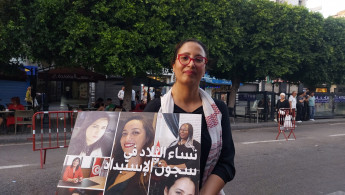Tunisia's women focus on Saied's 'misogyny' during national women's day
In Tunisia, women's rights activists took to the streets on National Women's Day to protest the authorities' repression of over thirty female judges and activists who were critical of President Kais Saied.
Marching from Habib Bourguiba Avenue to the Ministry of the Interior on Tuesday, 13 August, the protesters demanded the immediate release of Tunisian women in prison facing charges for exercising their freedom of speech under Saied's rule.
Since Saied's power grab in 2021, at least thirty-four women have been arrested, investigated, or barred from travelling, according to the non-government organisation, Legal Agenda.
Every year, on 13 August, Tunisia celebrates National Women's Day. But this year, the day witnessed a small but passionate protest against "the regime's misogyny", as described by Chaima Issa, who was Tunisia's first political prisoner under Saied.
Issa was arrested last February with other political figures. She was later released but received a suspended one-year sentence for "offending" the President.
"The regime's duality and hatred for women are clear", Issa remarked during the protest. "It's no surprise that female prisoners and bloggers are targeted under Decree 54, with possibly more cases still to come."
Crackdown on Women: From Politics to Migration
The latest target of Saied's crackdown was Abir Moussi, head of the Free Destourian Party, who has been imprisoned since October.
Last week, she was sentenced to two years in prison, just days after announcing her candidacy for the presidential elections. Moussi was set to be the only female candidate in the race.
Tunisian authorities have also targeted women's organisations challenging the state's anti-migration policies.
On 8 May, Saadia Mosbah of the Manamti Anti-racism Association and Sherifa Riahi, former head of Tunisia Land of Asylum, were arrested on charges of money laundering. Saied had accused NGOs of helping migrants to "destabilise the state" using foreign funds.
The president also claimed that the influx of migrants from sub-Saharan Africa is "part of a plot to alter Tunisia's demographic makeup".
Ghufran Benous of Manamti NGO and Fatima Zahra Latifi of the Integration for Justice and Equality Association were also investigated, as was Mira Ben Salah from the Integration branch in Sfax. She reported that her organisation was targeted over accusations of "settling migrants" and "conspiring with Zionists," which she categorically denies.
Moreover, government-led investigations have targeted female lawyers who are defending Saied's critics and former activists, including Bouchra Belhaj Hmida, who have been brought out of retirement to face charges of "conspiring against the state."
Women's rights NGOs fear that many more Tunisian women will be prosecuted under Decree 54, which imposes punishments of up to five-year prison terms for spreading "false news" or "slandering others" and up to ten years if the target is a public official.
Signed by Saied in September 2022, this broad-reaching decree has enabled him to suppress dissenting voices, says the opposition.
President Saied and Pinkwashing
When Saied first seized extraordinary powers, he gradually dismantled democratically elected bodies, replacing them with new ones directly under his control, and often with a higher rate of female representation.
He hailed this act as "a triumph and homage" to Tunisian women, particularly when he appointed Najla Bouden as the first female prime minister in the region, only to replace her two years later without providing any official reason.
Emna Sammari, a Tunisian gender analyst, argues that Saied's focus on gender equality was a distraction to his power grab. "When a weak democracy descends into authoritarianism, manipulating women's rights is a way to placate Western criticism," she says.
It seemed to have worked, and Saied managed to focus international attention on how he had women in his administration, and away from local critics warning of a democratic coup in progress.
Saied's feminist facade has now given way to a more conspiratorial, xenophobic approach, with particular emphasis on alleged foreign agendas. In that spirt, he enacted a new constitution in 2022 which required the state to "uphold Islamic values", which could limit human rights, particularly for women, says Human Rights Watch (HRW).
Tunisian feminists fear losing legal and social protections they fought hard to secure since the country's independence in 1956. Saied has also blocked efforts to legalise partial inheritance and improve women's socio-economic rights.
As Saied seeks re-election on 6 October, his strongest opponents remain behind bars or disqualified, leaving him facing one of his supporters and a little-known party leader.




 Follow the Middle East's top stories in English at The New Arab on Google News
Follow the Middle East's top stories in English at The New Arab on Google News


![A group of Palestinians, foreign and Israeli activists gather to participated in an olive picking event on the land in the town of Battir, which is under threat of confiscation by Israel in Bethlehem, occupied West Bank on 8 November 2024. [Getty]](/sites/default/files/styles/image_330x185/public/2182930803.jpeg?h=199d8c1f&itok=__0LgGsa)